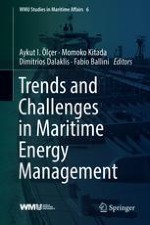2018 | OriginalPaper | Chapter
Overcoming the Challenges to Maritime Energy Efficiency in the Caribbean
Authors : Vivian Rambarath-Parasram, Sukhjit Singh, Deniece Aiken
Published in: Trends and Challenges in Maritime Energy Management
Publisher: Springer International Publishing
Activate our intelligent search to find suitable subject content or patents.
Select sections of text to find matching patents with Artificial Intelligence. powered by
Select sections of text to find additional relevant content using AI-assisted search. powered by
